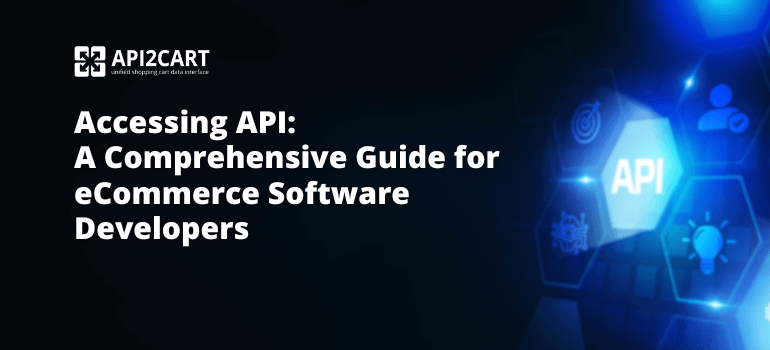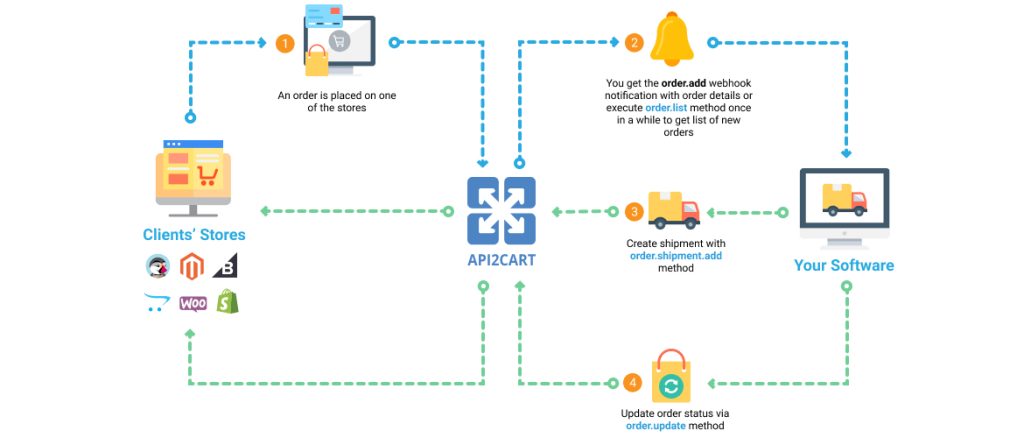
Introduction to Accessing APIs of eCommerce Platforms
Since online stores are built on eCommerce platforms such as Magento, Shopify, WooCommerce, or any other platforms, accessing API of these eCommerce platforms is crucial for connecting external software solutions to the stores. APIs (Application Programming Interfaces) enable developers to connect their eCommerce software, for instance, shipping management tools or inventory, to pull orders, customers, or product list data. For instance, shipping software needs to get order details through the API of the platform to facilitate shipment and timely and effective delivery of goods.
Every eCommerce platform has an API with an endpoint, which makes it possible for developers to pull data out from the system or input data. APIs are a way to engage with other systems and request data as well as initiate certain actions, update information in real time, and add features and capabilities to applications.
Why eCommerce Software Needs API Access
Shipping management systems, ERP tools, and inventory management systems commonly used in the eCommerce industry also depend on API access to perform their roles. APIs act as the interface between the software and the eCommerce platforms to facilitate the exchange of data that is concerning order, customers and stocks. Without this access, central management of key operational processes would be substantially dependent on entering data, which is time-consuming and involves a significant risk of error.
In the case of shipping software, APIs are important for retrieving orders and customers’ data from platforms such as Shopify or WooCommerce. This data is used when producing shipping labels, tracking delivery of shipments and making sure that orders are delivered to the correct place at the correct time. Likewise, ERP applications use APIs to capture and monitor real-time inventory information and products’ availability to make certain that businesses don’t run out of stock or sell beyond the available inventory.
Common Challenges Related to Accessing API
Integrating with APIs of eCommerce platforms could pose several technical issues that developers need to solve to have seamless integrations. One of these is the area of authentication and authorization. Each platform provides various ways of API authorization. For example, Shopify implements OAuth, while Magento and WooCommerce use tokens. This means that it must be ensured that your system is properly configured to allow for such various levels of authentication that would enhance the security of the system.
Other challenges include not detailed API documentation and constant updates of APIs. Platform APIs are dynamic and the API endpoints or the structures of data may change over time to disrupt or affect current connections. The best way to resolve it is keeping abreast of the changes happening to the particular platforms and ensuring that the code used is as fluid as is possible.
The last one is the problem with data synchronization, that is usually considered to be a very important issue as well. Order, inventory and customer information must always stay in real-time synchronization across platforms, especially in multi-channel environments. Software developers need to have good solutions on how to handle data flow between their software and eCommerce systems, as well as proper error control.
Data Types You Can Access via API
When accessing API of eCommerce platforms like Shopify, Magento, and WooCommerce, developers can obtain numerous important data types that are critical to the automation of different processes.
The most important data type is the orders. When accessing API of eCommerce platforms, the developer is able to get full history of the orders and their status, payment information, shipping information and the items contained in the order. This is particularly useful for shipping management and fulfillment automation solutions.
Customer data is yet another important type of data that can be retrieved through APIs. This includes customer’s contact details, buying patterns, etc.
Product information is also often retrieved through APIs. Some of the useful information that developers can get are the product name, its description, price, quantity in stock and variations. It is crucial for inventory management software and dynamic pricing tools to ensure product catalog remains updated in the multiple platforms.
Real-World Use Case: Integrating Shipping Software with eCommerce Platforms
Using APIs to connect shipping software to eCommerce platforms is inevitable for the automation of order processing and shipment creation. API2Cart is a perfect unified API that allows shipping software to integrate with different platforms such as Shopify, Magento, WooCommerce, and others.
For example, using API2Cart, a shipping software can pull order information from an online store easily. After placing an order, API2Cart allows the software to retrieve essential information such as the shipping address, the types of products, and the quantity of products ordered. Once such data is extracted, the software can generate shipment labels, estimate shipping charges and issue tracking numbers for the customer.

API2Cart is a single API that connects shipping software and other eCommerce software to multiple stores without having to connect to each platform individually. This saves developers time and effort while offering a scalable solution for businesses managing multi-channel sales and fulfillment processes.
It is possible to try API2Cart for free after a demo call with a manager.



